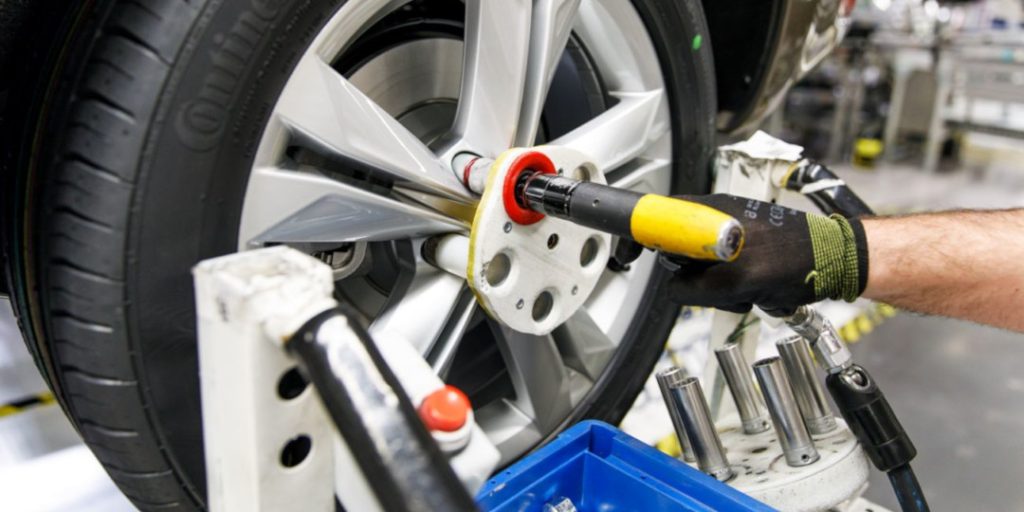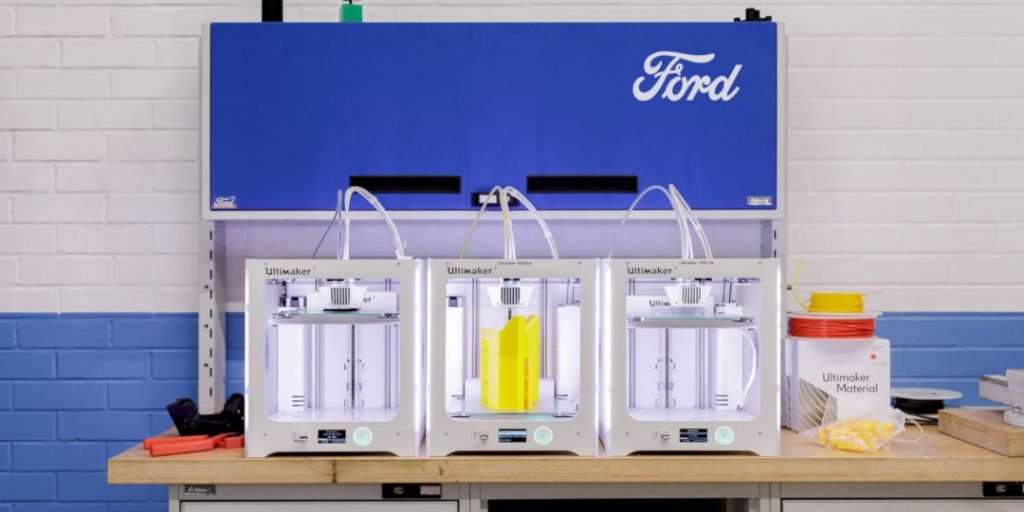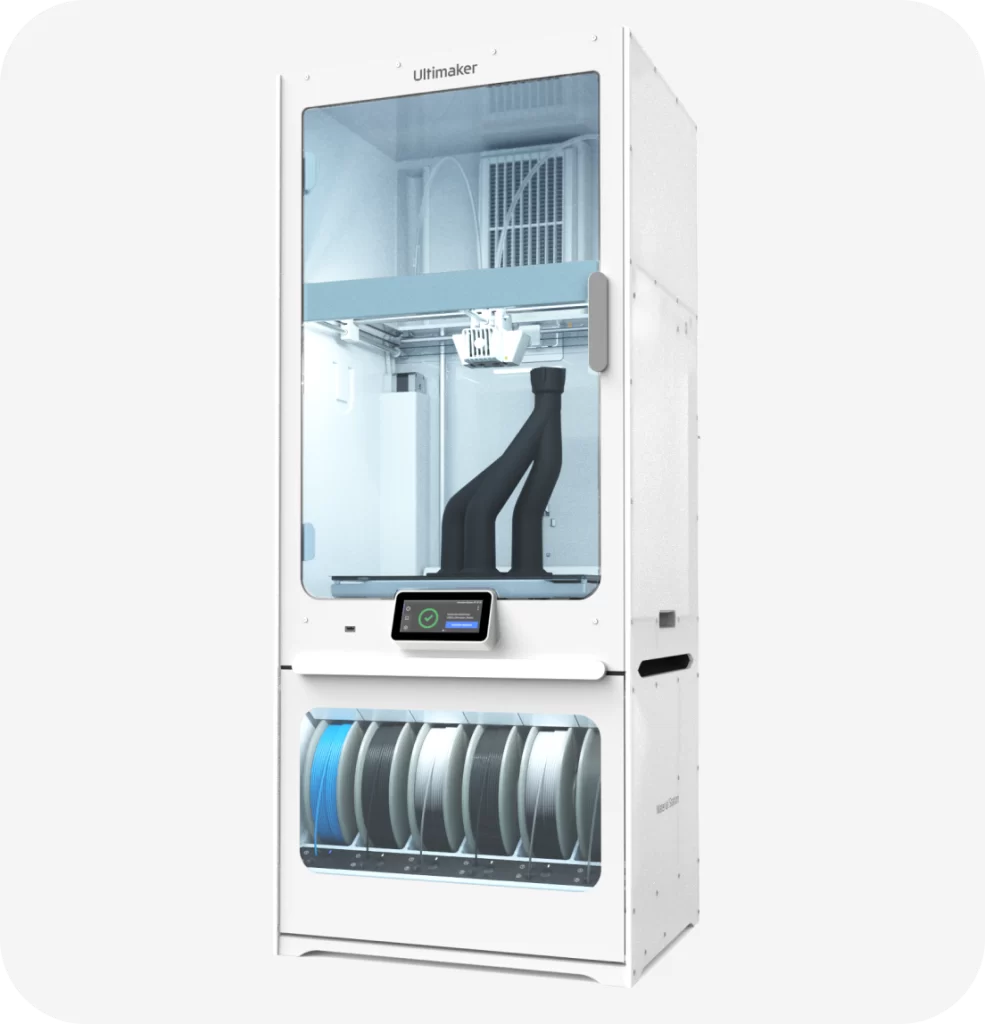UltiMaker is a pioneer in bringing 3D printing technology into manufacturing workflows with its range of high-performance, industrial-grade 3D printers and user-friendly software and materials.
A critical application is prototyping – companies use UltiMaker 3D printers to quickly create design concepts and test models before investing in traditional production tooling. This accelerates development cycles and allows more design iterations. Additive techniques also enable the creation of complex geometries which are impossible with subtractive methods.
For short-run production, large 3D printer models like the UltiMaker S7 excel at customisation and small batches. It eliminates the overhead of mould creation, enabling profitability at lower volumes. As materials and printer reliability improve, 3D printing also shows increasing promise for end-use parts.
Finally, 3D printing is transforming production tooling. Printing jigs, fixtures, and assemblies with high-performance plastics and metals with the UltiMaker Metal Expansion Kit opens new opportunities for manufacturers to save money.
Additive Manufacturing Use Cases
Volkswagen: Agile Production of Custom Factory Tools
Volkswagen Autoeuropa uses a fleet of UltiMaker 3D printers to rapidly design, test, and manufacture custom tools, jigs, and fixtures used in their vehicle assembly lines. For example, by 3D printing liftgate badges that properly position a vehicle emblem, Volkswagen reduced the cost from €400 to just €10 per part—the delivery lead time also dropped drastically from 35 days to 4 days.

By bringing rapid tooling in-house, Volkswagen estimates they have saved approximately €475,000 in just two years of 3D printing production parts. The ability to quickly iterate tool designs and manufacture parts on demand provides invaluable agility. As new vehicle models are launched, engineers can digitally adapt fixtures and workflows rather than wait months for third-party delivery. This accelerated product development allows factories to start full-scale manufacturing faster.
Ford: On-Demand Digital Manufacturing
Ford relies extensively on UltiMaker fused filament fabrication technology to create custom tools and spare parts for its European factories. With 3D printers located on-site, engineers and line workers can manufacture the tools they need without delays from external vendors. This local digital production allows factories to improve line uptime by printing spare parts as soon as any machine goes down.

Ford also leverages generative design software that allows workers to create their jigs and fixtures on-site easily. By digitising tool production, lead times are reduced from weeks to days while costs per part drop by up to 90%. Additive manufacturing also provides improved ergonomics since lightweight printed tools reduce fatigue versus traditional heavy metal tools used for hours on end.
As Ford optimises 3D printing used at its pilot plants, it is already expanding adoption to European production lines. UltiMaker printers provide the ideal flexible, distributed manufacturing solution.
Accessible Industry 4.0
As manufacturing embraces Industry 4.0 smart factory principles, UltiMaker provides an accessible entry point for businesses to adopt additive techniques. Alongside its reliable portfolio of industrial 3D printers, UltiMaker offers a comprehensive software ecosystem to manage digital workflows. This integrated platform approach lowers enterprises’ barriers to scaling up additive manufacturing across sites.

For example, UltiMaker Digital Factory allows centralised control and remote monitoring of multiple 3D printers via the cloud. Production engineers can use its capabilities to optimise print queues based on due dates, materials, and machine availability across a whole network. The software provides valuable insights to boost productivity, such as which printer models have the highest uptime.
UltiMaker CloudPrint similarly enables users to prepare, manage and monitor prints remotely through web browsers or mobile devices. This is particularly useful for distributed environments with locations across different geographies. Plants can easily share 3D files and print status rather than manually transporting physical files.
Materials and Partnerships
UltiMaker offers one of the largest material selections in desktop 3D printing, with over 280 validated print profiles.
Their filaments cover the most common needs – from versatile, easy-to-print PLA available in 11 colours to durable nylons and flexible TPUs that withstand higher heat and impact.

But UltiMaker goes beyond the basics by partnering with over 60 leading materials companies to certify third-party filaments optimised for their printers, opening the door to advanced materials like BASF’s engineering-grade Ultrafuse metal polymer.
Other notable materials include PET-CF, PETG for thermal resistance up to 76°C, ABS with 87°C heat tolerance and high impact strength, PP that can withstand 99°C temperatures, and CPE+ engineered for 100°C heat resistance. Spools are NFC-enabled with validated print profiles to ensure optimal print quality.
With this range of polymers, composites, and metals certified to work with UltiMaker printers, manufacturers can select the perfect material for their application – visual prototypes, end-use parts and production aids, or specialised applications in automotive, defence, manufacturing, and more, skipping third-party material ecosystems for UltiMaker’s steadfast quality control.
Summing Up
UltiMaker is at the forefront of bringing additive manufacturing into production environments.
By providing reliable 3D printers and an integrated software platform, UltiMaker makes it easier for manufacturers to adopt this technology across their operations.
With user-friendly desktop printers for distributed digital fabrication and high-performance models for short-run production, UltiMaker enables on-demand, agile manufacturing. Companies can quickly iterate designs, produce customised products, and print spare parts and tools.
Additive techniques are a valuable supplement to traditional mass production. For product developers, rapidly creating prototypes speeds up launch timelines. On the factory floor, 3D-printed fixtures, jigs and components increase efficiency. As materials science progresses, printed end-use parts become viable for low-volume batches.
Embracing additive manufacturing with UltiMaker allows manufacturers to save significant time and money through faster development cycles, lower tooling costs, reduced spare part inventories, and greater production flexibility. As innovators like Volkswagen and Ford have found, UltiMaker’s 3D printers and software solutions provide the perfect starting point to begin realising these benefits.




